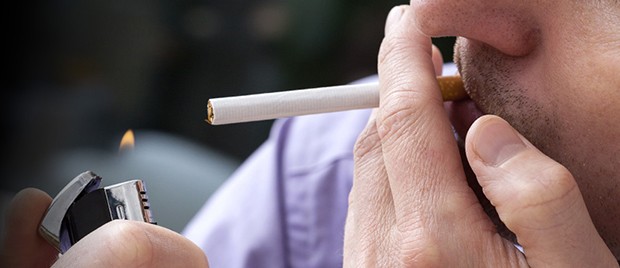Erin O’Loughlin is a certified personal trainer, pre-post natal and Barre fitness instructor. She is also a research coordinator at the CRCHUM working on the project AdoQuest, whose main objective is to determine the extent of co-occurrence of modifiable lifestyle behaviors among youth along the life course.
Blog post
Social and Occasional Smoking Is Still Smoking - Don’t Kid Yourselves!
 Lighting up, even just once, has consequences
Lighting up, even just once, has consequences
Young adults have the highest rates of smoking in Quebec and Canada. In 2015, the prevalence of smoking in Canada was 19% among young adults ages 20-24 compared to only 13% among adults ages 25 or older.
In Québec, the 2014-15 prevalence was 21% and 24% in young adults ages 20-24 and 25-34, respectively, compared to 19% among 35-44 year-olds. Many young adult smokers smoke up to 25 (or more) cigarettes a day; many have been smoking for years, and many express a desire to quit.
Unfortunately, only 9% quit successfully, even when they are highly motivated and have numerous good reasons to quit.
Among young adult smokers, there is a very interesting and at the same time, puzzling subgroup - people in this subgroup smoke less, express no motivation to quit, have not made any quit attempts, and do not rate as important, any of the common reasons to quit (i.e., for personal health, for the health of others, to reduce cost). In addition, and importantly, these occasional or “social smokers” self-identify more as non-smokers than as smokers……hence their lack of reasons to quit, motivation to quit, and quit attempts.
However, non-smokers they are not!
The evidence tells us that it doesn’t matter if you smoke once a month or 100 times a month, you are still a smoker, and there are short- and long-term health risks associated with occasional smoking.
Short-term risks are similar to those of daily smoking and include increased heart rate, higher adrenaline levels and increased blood pressure. We all know the long-term risks including cancer, lung disease and heart disease.
One basic issue that affects all smokers including those who don’t admit to being a smoker, is that you cannot tell if you are one of the people who are highly vulnerable to the effects of smoking – does your genetic makeup make you highly susceptible to smoking? How will your body react to different doses of smoking? Will you develop dependence on nicotine quickly? How will you cope with symptoms of nicotine dependence? Which smoking-related disease are you susceptible to?
An occasional smoker who is genetically “unlucky” could wind up with more ill effects from smoking than a more frequent smoker who is “protected” by his/her genetic profile.
This is just the luck of the draw and unless there is a strong family history of smoking-related health issues, you won’t have a clue about whether you are going to suffer from your smoking sooner or later.
Occasional smoking can decrease your lifespan. Even smoking just one cigarette a day increases your chances of dying early by 64% compared to non-smokers. The chances of dying early are increased by 87% among those who smoke about 10 cigarettes a day.
In addition, occasional smoking for many years can eventually progress to daily smoking depending in part on whether you develop symptoms of nicotine dependence including craving and withdrawal. So that harmless twice a week habit might progress to 4-5 days a week, and maybe to daily smoking before you know it.
If you are not addicted now, why risk it? In addition to the risks to your own health, occasional smoking exposes others to second- and third-hand smoke. Don’t kid yourself about that either – chances are that blowing your cigarette smoke into the air will expose lots of others (even children) to the harmful effects of smoking.
Many occasional smokers in the young adult category think that they will stop smoking when they graduate from college or when they get older, but don’t realize that they are actually addicted now, or on the road to addiction, and that it will be hard to stop. The same exposures that make you want to light up when you are young (alcohol, friends, coffee) will still be there when you transition into middle and late adulthood.
The thing is, you need to be honest with yourself about your smoking.
If you are a social smoker, ask yourself if you have experienced any symptoms of dependence and if your health has been affected. Try not smoking the next time you go out with your friends drinking. If it’s difficult to not smoke when you are guzzling down that beer, you may want to actively think about quitting before it’s too late and you are fully addicted. Try it as an experiment!
Other smoking behaviors to be mindful of include tracking how much you smoke (cigarettes per night, week, month). Also, when do you smoke the most - is it when you are out with friends? On work breaks? When you feel stressed? Being mindful of your smoking habits may open your eyes as to why you use cigarettes, which could pave the way to quitting.
Also, know that smoking is not who a person is………it is what a person does.
Although it may be easier on your conscience to identify yourself as a non-smoker (especially since it’s now socially unacceptable to smoke), it is better to be honest with yourself in the long run, for your own health and for the health of those around you.
Finally, there is nothing wrong with seeking help to stop your social smoking. There are plenty of resources locally and online. When you actually do quit and never smoke again, you will truly be a non-smoker. If you know a social smoker, please share this blog with them to help them become more informed about their smoking.
About the author
